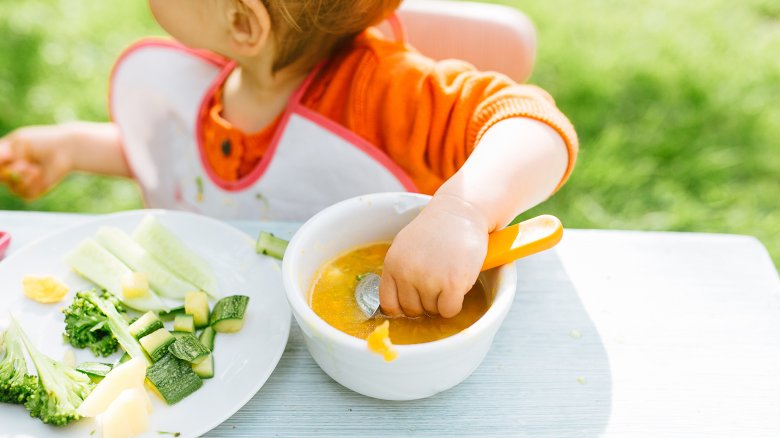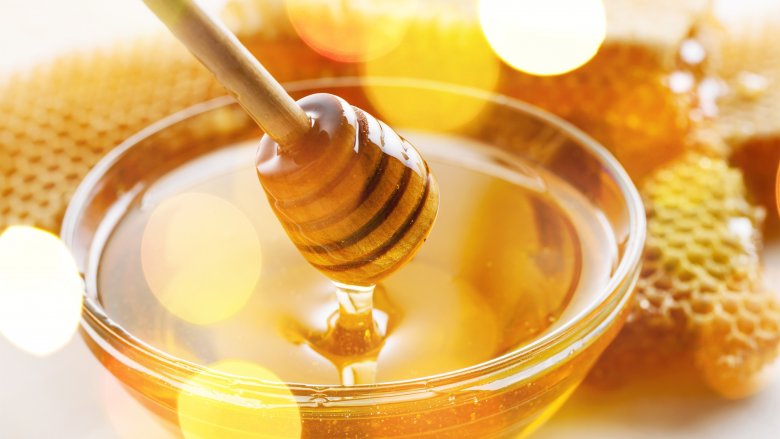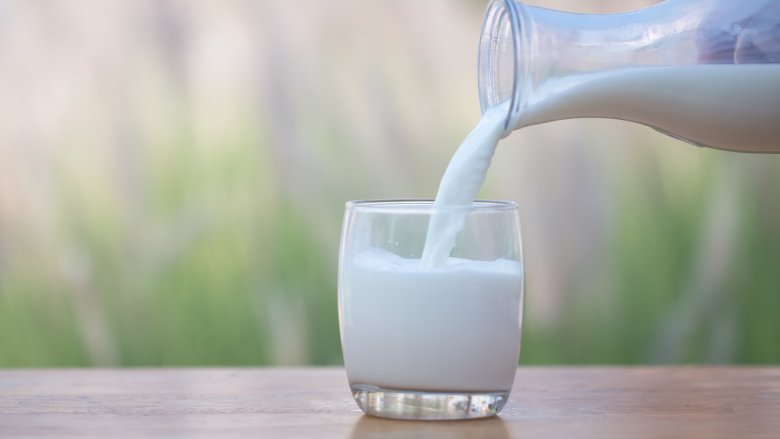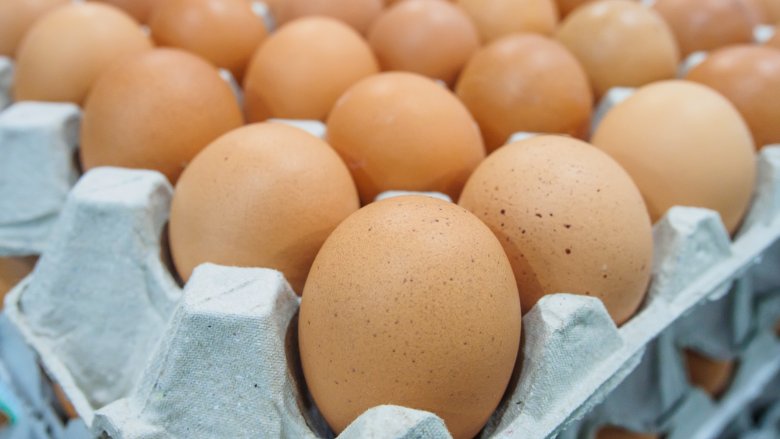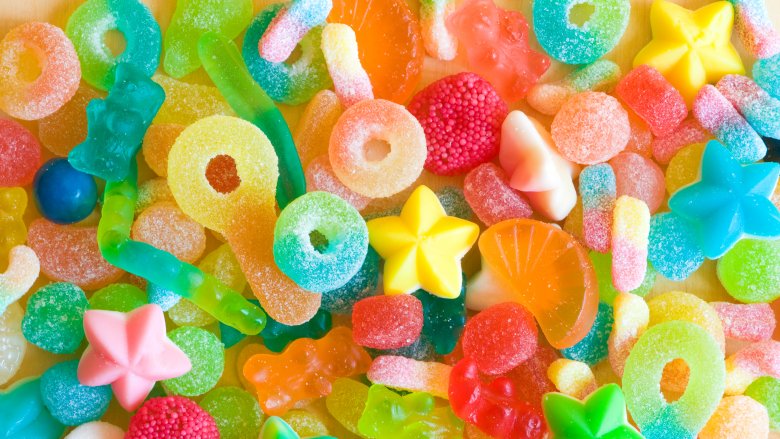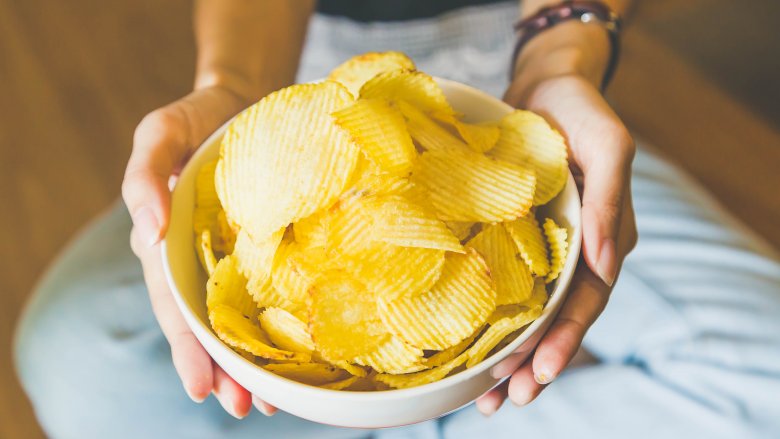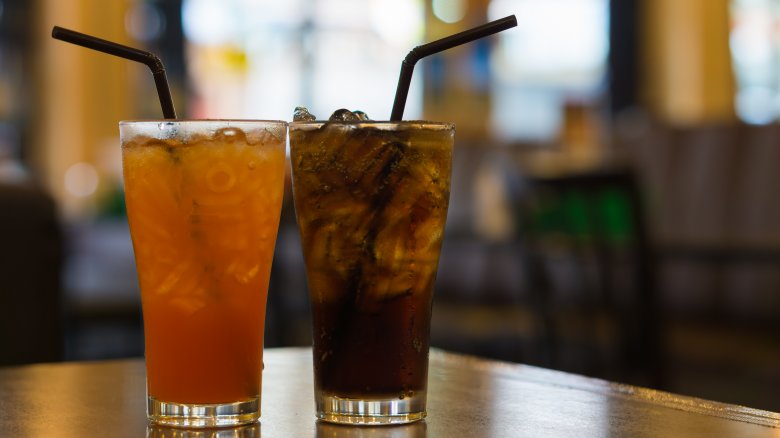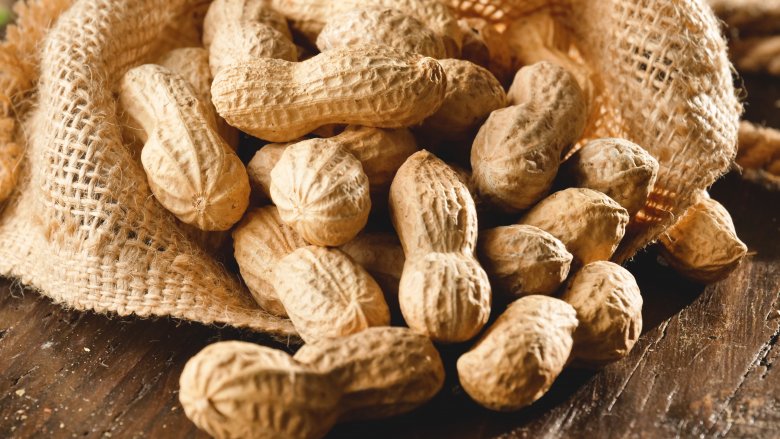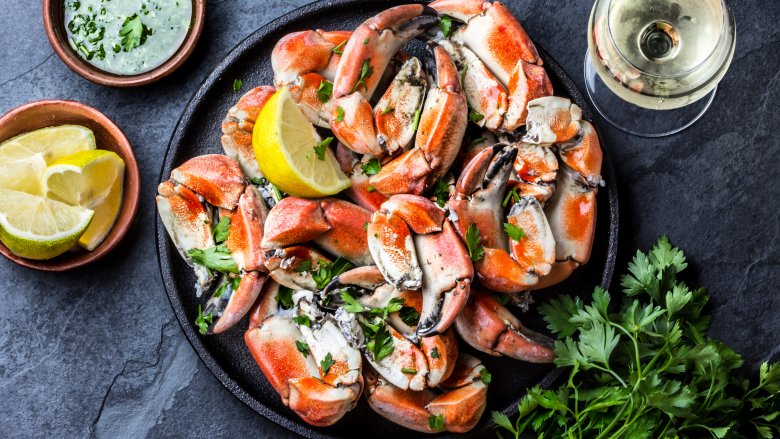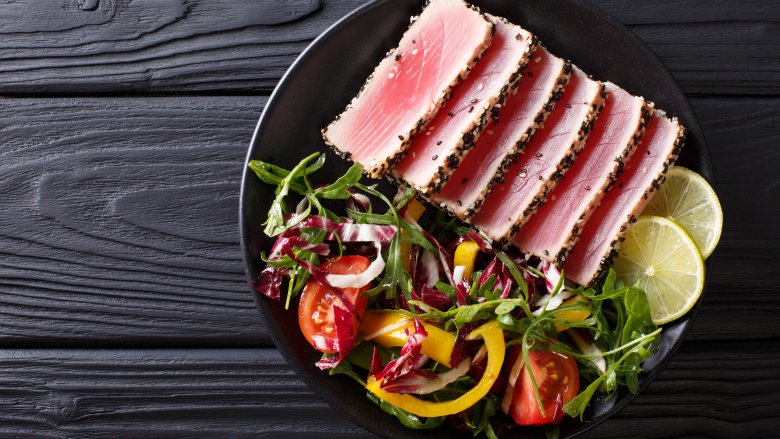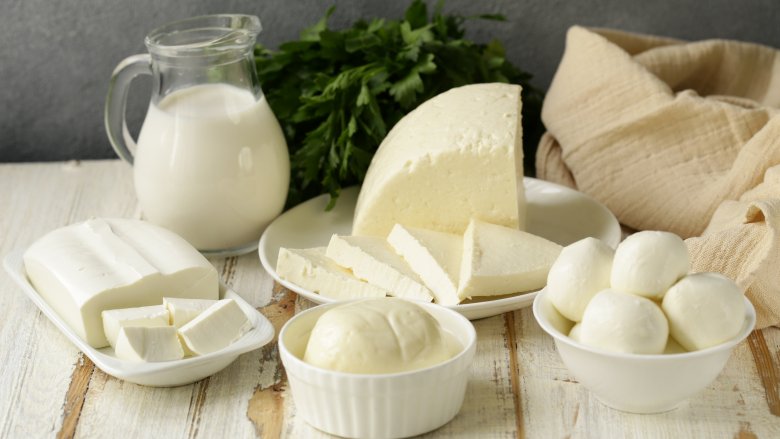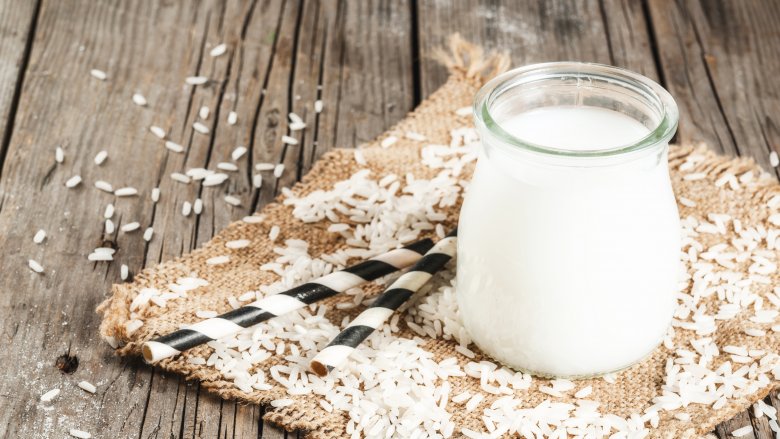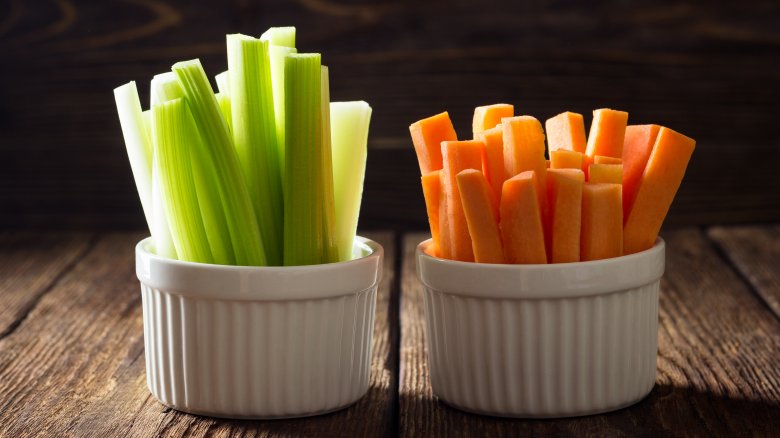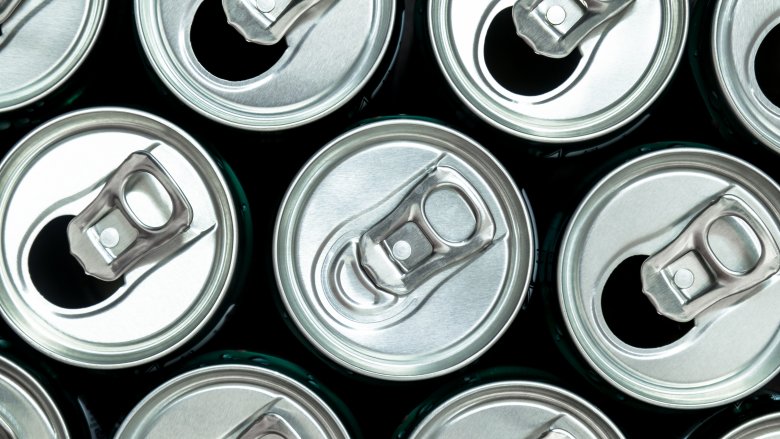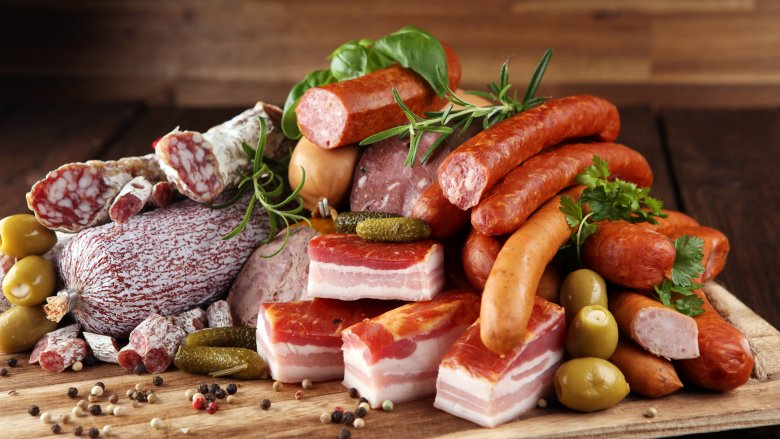Dangerous Foods You Should Avoid Giving Your Baby At All Costs
Having a baby can be a terrifying thing, but the scary moments don't stop after the baby is born. Another terrifying step for some parents is the process of giving them solid food for the first time. After months and months of milk, the very idea of feeding an infant proper, actual grown-up food (even if it is mashed to bits) is enough to make even the most steadfast parent worry. Sadly, there's not a lot out there to put you at ease. While some foods can suit your child just fine, and others are actually highly recommended, there are plenty of things out there that constitute genuine hazards for anybody under the age of 1.
Some foods that are otherwise humdrum and inconsequential for adults can be dangerous (or worse, fatal) to babies. Some of them can trigger severe reactions in young bodies, some present choking hazards, and some are just downright bad for infants. Take a look, and take note — these are the foods you should never feed your baby.
Honey
Honey may seem like one of the healthier things you could give to babies (after all, it's natural, tasty, and provides a decent sweet alternative to sugar-heavy foods) but it might well be one of the worst.
Occasionally, honey can contain spores of a bacterium called clostridium botulinum. If babies ingest it, they can come down with infant botulism, a rare form of food poisoning which causes muscle weakness, poor feeding, constipation and lethargy. While adults and older children can digest the bacteria with no side effects, babies cannot. It's also worth keeping in mind that honey-flavored or honey-infused foods can also cause infant botulism, so avoid honey graham crackers, fruit smoothies sweetened with honey, and anything that explicitly contains that natural sweetener.
Not only that, but honey can also damage your baby's teeth just as badly as sugar. If you're after a sweet touch to your baby's diet, try giving them fruit, either puréed, mashed, or dried. Not only do they not run the risk of making them sick, but they also contain plenty of vitamins and minerals — which are never a bad thing.
Cow's milk
Considering babies live off breast milk or formula for the first few months of their lives, it seems odd that cow's milk is such a no-go when it comes to their diets. Infant stomachs are incapable of digesting cow's milk in any large volumes. Those who are fed milk from a cow can suffer from irritation of the gut lining, which can cause blood loss and anemia. For their first year, babies should only drink breast milk or formula.
Once they're a little older, though, cow's milk can be a great inclusion in a child's diet, since it contains nutrients such as protein, calcium and potassium, as well as vitamins A, B and D. Start gradually introducing your baby to cow's milk from the age of 1 (keeping an eye out for allergic reactions), mixing in formula or breast milk if they don't take to it immediately. Even then, try not to give your child more than 20 ounces of cow's milk a day, or they run the risk of coming down with iron deficiencies.
Egg whites
Certain parts of an egg are healthier for babies than others. The egg whites in particular, for example, are best avoided. The main problem here is that egg whites can be a highly allergenic food, since this part of the egg contains four different proteins which can each cause allergic reactions of varying levels of severity. As a result, most pediatricians recommend that egg whites not be fed to babies before their first birthday.
In recent years, however, the consensus on this subject has shifted a little. A study in 2008 suggested that holding off on giving babies eggs may not prevent atopic diseases and reactions such as eczema, while others are beginning to argue that babies can be fed whole from the start, so long as they're not particularly susceptible to allergies. Still, considering egg allergies can lead to runny noses, itchy eyes, skin rashes and even anaphylaxis, a lack of clarity on the safety of egg whites might be enough to make some parents stay well clear — or at least have a serious discussion with your pediatrician.
Sugary foods
Yeah, this shouldn't come as much of a surprise. Candy, chocolate and other sugary foods are bad enough for adults, so giving them to babies is something of a faux pas, too. In fact, the American Heart Association recommends that babies and toddlers not receive any overly sugary foods until they're at least 2 years old. According to a 2018 Feeding Infants and Toddlers Study (via dietitian Jill Castle), 27 percent of children between the ages of 1 and 3 don't eat any vegetables each day, while 75 percent of children between 1 and 2 eat sweets every day. That number rises to 90 percent for 2 and 3-year-olds.
The effects of this are grim and predictable. Babies who eat too much sugar will gain weight, suffer from nutrient deficiencies, develop cavities, and likely have a preference for sweet flavors later in life, causing further problems down the road. Keep 'em healthy — don't let them get their hands on candy until they're a little older.
Salt
Just like sugar, salty foods can be detrimental to your baby's health. We all know that a diet high in sodium later in life can be a recipe for disaster, and strong preferences for those foods as older children and adults often start with exposure to salty foods at a very young age. If a baby under the age of 1 is receiving breast milk or formula, they are probably getting enough salt in their diet. Once they move on to more solid foods, avoid adding salt, and limit foods that are high in salt like bread, chips, canned soup, and jarred pasta sauces.
Encouraging a preference for salty foods isn't the only issue, either. A diet high in salt can cause damage to an infant's kidneys, as they're not yet able to process it. According to the NHS, babies in their first year should have less than 1g of salt a day, which works out to less than half a teaspoon. Considering how much salt is added to prepared foods, it's not hard to go over that mark.
Soft drinks
Just like sugary foods, soft drinks can also prove hazardous to your baby's health. Not only are they laden with sugar (hello obesity; hello dependence), they're also incredible acidic and can damage your baby's fragile emerging teeth. Not only that, but they can also spoil their appetites, meaning they're less likely to eat the nutritious foods they actually need, and can cause diarrhea if their digestive systems are forced to cope with too much fluid and all that sugar in one go.
But it's not just soda that is bad for babies. Fruit juices aren't only entirely unnecessary to any baby who is getting enough fruit and vegetables in their diet, but they're also just as high in sugar. This also goes for smoothies, flavored milks, and milkshakes. Instead, stick to milk or water. If you really want to give them fruity drinks, blend soft fruits and limit their intake to no more than about a half a cup per day.
Whole peanuts
Considering peanuts are so notorious for their allergenic nature — often proving fatal to adults who suffer from a sensitivity to them — it should seem obvious that babies shouldn't be given them. But some research actually suggests that exposure to peanuts at an early age can actually reduce the chances of a child becoming allergic.
The danger with peanuts (and other nuts) actually lies elsewhere. Whole nuts of any kind should never be fed to a baby because they constitute a significant choking hazard. Not only that, but inhalation of a peanut into the lungs (which is also likely) can cause arachidic bronchitis and requires an unpleasant procedure to remove. Since most nuts can't be ground into mush by babies until they've developed their molars, it's best to steer clear during the early months of eating solid foods.
Don't fall back onto using a spoonful of peanut butter as an alternative, either: its viscous nature means it can be easily caught in the throat and cause choking. Instead, blend peanut butter into other foods, like yogurt or pancake batter, or sprinkle crushed peanuts into applesauce.
Too many allergens at once
A few of the foods we've covered up until now are problematic for babies because they're allergens, and can cause adverse reactions in children. But it's also worth considering just how you're going to introduce any food which can be described as allergenic to your child's diet. This is worth remembering in particular if your baby already suffers from an allergy, or if you have a family history of suffering from allergies.
The golden rule: go slow. Introduce allergenic foods — cow's milk, eggs, gluten, nuts, seeds, soy, shellfish and fish — one at a time and in small amounts so you can gauge whether your baby reacts. Go in too hard and with too many foods and you'll have no way of telling which foods are causing an allergic reaction, if one appears. If there's no reaction to a particular food (look out for vomiting, diarrhea, coughing, rashes, swollen lips, runny noses, and red eyes), keep it in your baby's diet to prevent any allergy from developing. And finally, if it looks like your baby is suffering from anaphylaxis (symptoms may include wheezing, difficulty breathing, clammy skin, fast heartbeat), seek medical attention immediately — it could be life-threatening.
Mercury-heavy fish
Fish can be a great addition to a baby's diet. It can provide a range of nutrients such as omega-3 fatty acids, protein and vitamin D among others. Be careful which fish you give your baby, though, because some of them are better off avoided. Mercury is the biggest danger, here — the body absorbs mercury contained in fish very easily, and even low doses can affect the brain and nervous system. Because they're still developing these parts of their bodies, babies are particularly susceptible to high levels of mercury.
The fish species you want to keep in your baby's diet include salmon, trout, anchovies, herring, sardines and shad. But the FDA recommends that swordfish, shark, king mackerel and tilefish sourced from the Gulf of Mexico should be absolutely avoided by babies and small children. Some groups and expert suggest that babies also stay away from fresh and frozen tuna, striped bass, bluefish, Chilean sea bass, golden snapper, marlin, orange roughy, amberjack, Crevalle jack, Spanish mackerel from the Gulf of Mexico, and walleye from the Great Lakes. Canned tuna is a little trickier, with some experts saying it should be avoided altogether, but the FDA recommends that children keep their intake of chunk light tuna down to two servings a week, and solid white tuna down to one per week.
Unpasteurized foods
This is another general rule of thumb for introducing solid foods to your baby: Stay away from anything that's unpasteurized. Pasteurization is the process of using heat to remove harmful bacteria from food without removing the food's nutrients. Generally, food items that are sold at farmers' markets, farms, orchards and roadside stands tend to be unpasteurized, but unpasteurized foods can also be found in grocery stores.
The bacteria which are destroyed by pasteurization can be incredibly harmful to your baby. They include Salmonella, E. coli and Listeria, all of which can cause serious illnesses which are made worse for babies due to their weak immune systems. Foods which can often be found unpasteurized include milk, cheese (especially soft cheese), juices, ciders, and honey (which you're staying away from anyway, right?). Always make sure these have been pasteurized if you're hoping to include them in your child's diet, even after the age of 1. If you can't be certain, it's probably better that you don't take the risk.
Rice milk
We've already established that cow's milk is no substitute for breast milk or formula, but there's one other type of milk that babies ought to be kept away from at all costs: rice milk. For adults, rice milk can be a great alternative to cow's milk, partly because it's the least allergenic of popular milk alternatives. It does have a few downsides, however, with one in particular being that it's dangerous for young children.
Rice milk, like rice itself, contains arsenic. In fact, it contains so much arsenic that Consumer Reports scientists suggested in 2012 that children under the age of 5 not have rice drinks every day. In the United Kingdom, medical experts even go so far as to recommend that very young children not drink any rice milk at all. Of course, it doesn't help that rice milk has far less protein than cow's milk, too, meaning you'd need to make that deficiency up in other ways.
Raw vegetables
Vegetables are, for obvious reasons, a fantastic thing to give to your baby. As soon as they're on solids, it's actually pretty crucial that they be getting plenty of veggies (and fruit!) to keep them growing strong. It's just as important, however, that they stay away from raw vegetables, as they constitute a pretty major choking hazard for the little ones since they're not so easy to chew. They can also be pretty tough for babies to digest, and may, in extreme cases, lead to diarrhea.
Just make sure that you cook all vegetables until they're very soft and you'll have no problem. The cooking process also alters the protein in fruit and vegetables and makes them less likely to cause allergic reactions. And as a final bonus, cooking them should give you peace of mind with regards to any contamination or bacteria that may be lurking on the raw produce.
Caffeine
Frankly, caffeine is something you ought to be avoiding as an adult as much as you can (though we'd never begrudge you that morning coffee), so keeping it out of your child's diet should be a given. Caffeine can be present in soda, energy drinks, coffee (we're going to assume nobody here is giving their kids coffee, but still, it must be said), tea, and more.
Experts tend to agree that caffeine is best avoided by children of any age, never mind babies. In children, it can cause nervousness, headaches, stomachaches, lack of concentration, trouble sleeping, increased heart rate, and high blood pressure. Babies and toddlers have all those risks and more, including seizures and heart arrythmias if given in large amounts. Think of it this way: caffeine isn't so much a food as it is a drug. And you wouldn't drug your child, would you?
Cured meats (and other foods high in nitrates)
Nitrates are chemicals which, unfortunately, are pretty much everywhere. They're added by manufacturers to many meats, including cured meats, bacon, salami and sausages, in order to prolong their shelf lives and add color. But nitrates (as well as nitrites, a similar chemical) also form nitrosamines in the body, which lead to a higher risk of cancer. To minimize your child's intake of preservative nitrates, avoid food products which list sodium or potassium nitrates and nitrites as ingredients. Eating a diet high in antioxidants and vitamins can also stop those pesky nitrates and nitrites from becoming nitrosamines.
And while naturally occuring nitrates (such as those found in spinach, carrots, beets, green beans and squash) won't cause you any harm, they can cause problems for babies — and lead to an illness known as methemoglobinemia, which is a blood disorder that can be fatal. This is one of the main reasons why babies shouldn't eat solids before the age of 4 months, but if you're getting them onto real food any earlier than normal (normal being about 6 months) it's probably best to avoid high-nitrate foods, just in case.
